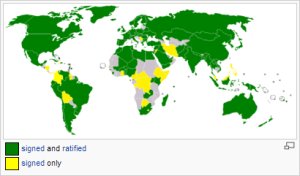

“Congratulations. You just wasted your money.” That’s what I would say to you if you’d just told me you’d bought anything in space: part of the moon, the entire moon, a star, a name for a star, a distant planet, and so on. All you will have done is given some chap your money, and he’ll have given you a piece of paper. Very expensive paper, admittedly.
The first big treaty that governs what you can and can’t own in space is called “The Outer Space Treaty,” which was implemented by the United Nations. It states exactly how much states can own in space: absolutely bugger all. This obviously only applies to signatories of said treaty, but all of the space faring countries (including some non-space faring countries, bringing the total signatories to 102) have signed up. And it’s highly likely that, if one of the few other countries managed to achieve space flight, then they would join the treaty either by choice or by forced. This applies to all forms of outer space, whether it is the moon, Venus, or something in Andromeda.

Some of you with ninja eyes might have spotted that the Outer Space Treaty only applies to states. Well, technically, it does. Whether or not this treaty applies to individual citizens has not yet been tested by any court. What does apply, however, is something called corollaries (try saying that ten times really quickly). “Corollaries” basically mean that you can’t claim any unfounded land unless you have ‘intent to occupy’. Whilst one might say that they intend to occupy the moon, when we can eventually get there commercially, this would not be lent any credence by the courts, as you would have no time scale for when you were going to occupy said land.
Mining is another complicated matter. Companies are chomping at the bit to be the first able to mine the moon, or even asteroids. The Moon Treaty was supposed to stop anyone, state or otherwise, from mining the moon, but the US, Russia, and China have signed it, so it seems a bit useless. With regards to asteroid mining, it’s more likely than not that private companies could well mine them. There is nothing in the Outer Space Treaty to prohibit them from doing so, although they would not have an exclusive claim to the whole asteroid – other companies would be able to join in on the feeding frenzy.
Whatever happens with regards to ownership of extraterrestrial lands, be sure that it’s going to be a very exciting time for humanity and the potential is, quite literally, limitless.

Pizza Hut logo credited to its respective owner. Image: Gizmodo
Sources and Further Reading: